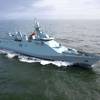Australian Leader Swap Weakens Japanese Sub Bid
The ouster of Australian Prime Minister Tony Abbott has further weakened a Japanese bid for one of the world's most lucrative defence contracts, a A$50 billion ($36 billion) programme to build stealth submarines for Australia, sources say.
Australia got its fifth prime minister in as many years on Monday after the ruling Liberal Party voted to replace Abbott with former investment banker Malcolm Turnbull, following months of infighting and crumbling voter support.
Abbott and Japanese Prime Minister Shinzo Abe, who ended a decades-old ban on weapons exports last year, enjoyed a close relationship that saw Japan emerge as the early front runner to replace Australia's aging Collins class subs.
But a series of missteps by the consortium of Mitsubishi Heavy Industries and Kawasaki Heavy Industries has seen its standing slide in recent months.
The companies irked Australian suppliers by failing to share important information about its proposal or discuss specific collaboration possibilities during a visit to Australia last month.
Although the delegation responded by saying that discussing such "teaming" arrangements before the contract was awarded was not allowed under the bidding process, the Australian admiral heading the programme told Reuters such discussions were fine.
Their unwillingness during the trip to commit to building the submarines entirely in Australia, where manufacturing jobs are a hot-button political issue, has drawn criticism from Australian politicians and labour unions.
The missteps underscored Japan's inexperience in bidding for global defence deals, experts said, highlighting the importance of Abbott's influence and the difficulty that his ouster could auger for Tokyo.
"We don't know what the impact will be yet, so all we can do is move forward with the bid," a Japanese defence industry source in Tokyo told Reuters. "It is, however, unlikely we will see the closeness we saw before."
With Abbott and his pro-Japan National Security Advisor Andrew Shearer out, there is no longer a strong pro-Japan voice left in cabinet, three industry sources in Canberra said.
"We've always said it should be decided on its merits and now we're pretty confident that it will be," an Australian source involved in the bid told Reuters.
NEW DEFENCE MINISTER TIPPED
Turnbull has not commented on the project but is widely expected to name Education Minister Christopher Pyne as defence minister when he unveils his cabinet this weekend. Pyne represents the South Australian capital, Adelaide, the centre of the country's ship building industry.
Japan's reluctance to commit to building the submarines entirely in Australia, where manufacturing jobs are a hot-button political issue, prompted stinging criticism from local suppliers.
Japan's European rivals for the contract, ThyssenKrupp Marine Systems (TKMS) of Germany and France's DCNS, have said they would build the submarines entirely in Australia and courted local industry.
Each bidder must submit three proposals: one in which all of the submarines are built offshore, a hybrid mix of onshore and offshore and one entirely built in Australia.
On Thursday, Defence Minister Kevin Andrews, in a significant shift in rhetoric outlining the growing momentum for an onshore build of the kind to which Japan has declined to commit, spoke glowingly of DCNS' proposal to build in Australia.
"That means that we're going to have more jobs, a significant part of that build, perhaps 70 to 80 per cent of submarines, built here in Australia," Andrews told parliament.
Independent Senator Nick Xenophon, who represents South Australia, and Shadow Defence Minister Stephen Conroy also called on Turnbull to remove the overseas and hybrid options.
"I'd like to think that good public policy should be driven not by a warm friendship between two prime ministers, but by strategic and economic considerations and practical and technical considerations," Xenophon told Reuters.
Japan's Defence Minister Gen Nakatani played down the significance of the shuffle at a briefing in Tokyo this week.
"We will keep a watch on developments in Australia but we will continue as before to look at cooperating with Australia on its submarine," he said.
An expert advisory council expected to deliver its recommendation on the bids to the Australian government in November.
By Matt Siegel













